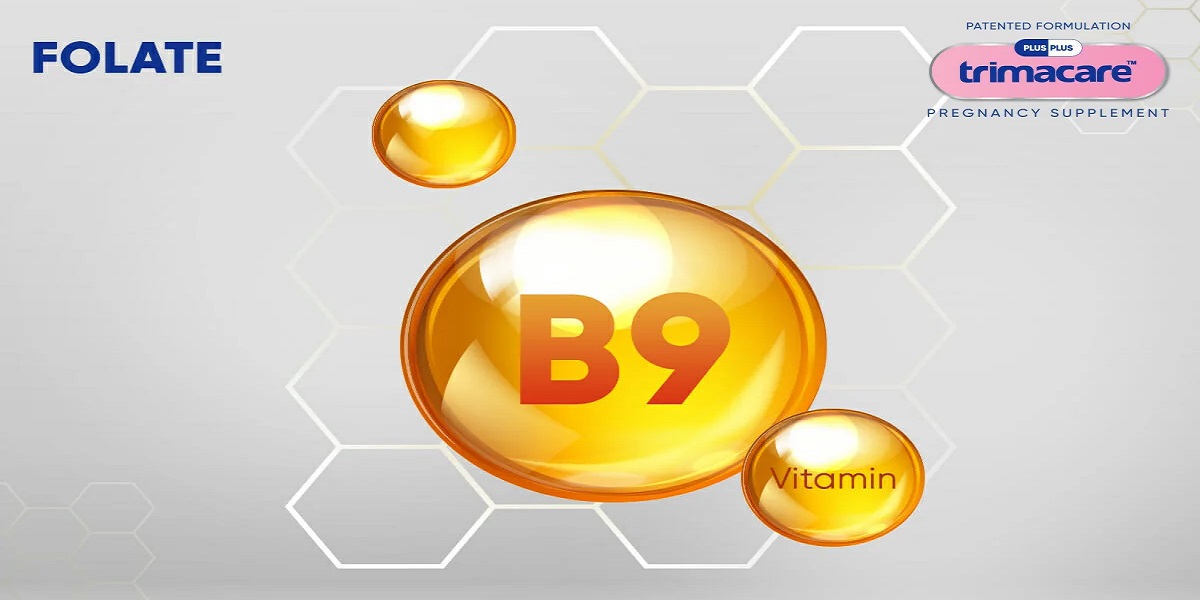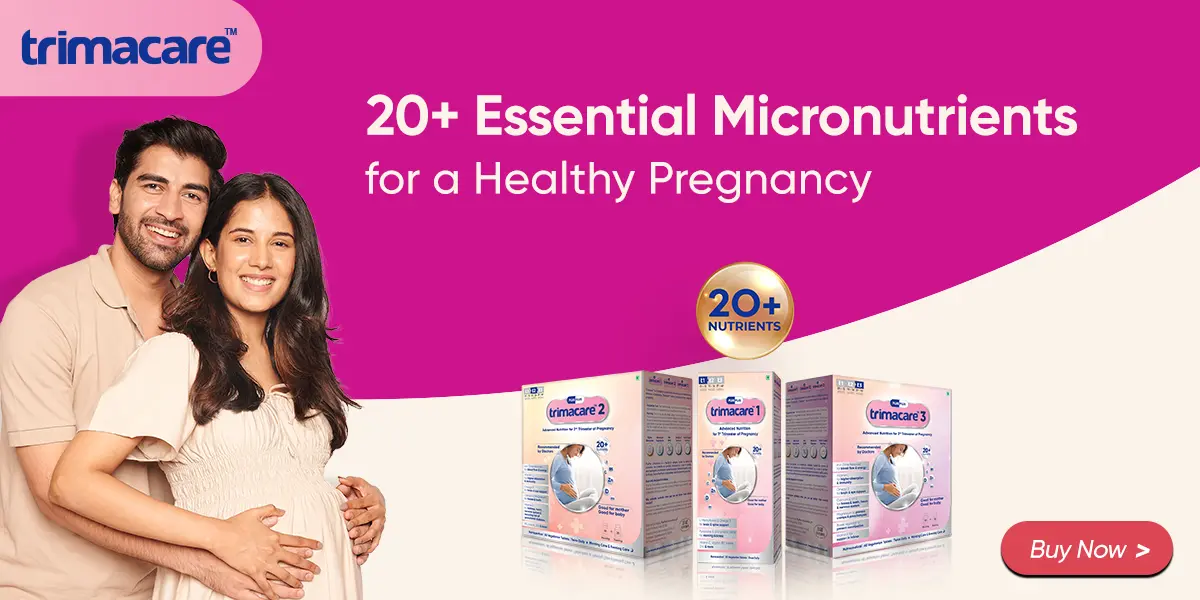Folate, also referred to as vitamin B9, is an essential pregnancy nutrient. It is essential for the rapid cell division and DNA synthesis that occur in the growing foetus and the mother.
Folate, sometimes referred to as vitamin B9, is an essential pregnancy nutrition. It is essential for the fast cell division and DNA synthesis that occur in both the developing foetus and the mother.
Folate has a direct impact on good foetal development and lowers the risk of several pregnancy complications, therefore, the importance of folate in pregnancy cannot be ignored.
Early in pregnancy, especially in the first trimester, the body’s need for folate changes drastically. So, it’s important to know how much is required, when to start supplementing, and which type of folate is the best for consumption in pregnancy.
Thus, folate during pregnancy is important for every pregnant woman.
Folate: What is it? What is folic acid?
Folic acid is the naturally occurring form of vitamin B9, which is widely found in plant-based foods. Whereas folic acid is the synthetic form commonly found in fortified-foods and supplements. Both help in:
- DNA synthesis
- Cell division
- Development of foetal brain and spinal cord
Folic acid vs folate pregnancy: Know the difference
Folate and folic acid both are forms of vitamin B9. Folate is a naturally occurring form found in foods, while folic acid is the synthetic form used in supplements and fortified foods.
However, people with the MTFR gene and folate mutation may not convert folic acid effectively. For these people, choosing L-methyl folate vs folic acid is not a preference but a necessity.
Therefore, many pregnancy supplements also include L-methyl folate for increased efficiency.
Benefits of folate during pregnancy
There are several folate benefits in pregnancy:
- It helps in neural tube defects caused by lack of folate, such as spina bifida and anencephaly and its prevention.
- Lowers the chances of low birth weight and miscarriage
- Supports maternal cardiovascular health
- Encourages a child’s cognitive development
These benefits highlight the importance of folate in pregnancy and why it’s a cornerstone of prenatal care.
Risks and Effects of Folate Deficiency
Serious consequences may arise from a deficiency of folate. Effects of folate deficiency during pregnancy include:
- Neural tube defects
- Developmental delay in a baby
- Maternal anemia and pregnancy tiredness
Causes of folate deficiency in pregnancy include–
- Digestive disorders
- Poor diet
- Genetic factors like the MTHFR gene and folate mutation
Thus, prenatal folate supplementation is crucial to prevent such complications.
Recommended Folate Dosage During Pregnancy
Health authorities have issued some guidelines regarding the folate dosage during pregnancy. These are as follows-
- ICMR recommends that Indian women consume 500mcg of folate daily.
- According to international guidelines, pregnant women must take around 400-600mg of folate daily.
- Women with a history of neural tube abnormalities may need upto 5mg of folate daily.
Knowing how much folate pregnant women should take and starting intake before conception is vital.
Food sources of folate
Supplements are important, but nutrition is equally important. These are some of the folate-rich foods for pregnancy:
- Leafy greens, such as methi and spinach
- Legumes like rajma and lentils
- Citrus fruits, such as lemons and oranges
- Nuts, seeds, and eggs
The best folate supplements for Indian pregnancy, are those that pregnant women naturally enhance their folate level. For more benefits, avoid overcooking of food and eat fresh produced food.
Supplements: What should Indian pregnant women choose?
It’s important to choose the reliable folate pregnancy supplements in India, particularly when they have to choose between L-methyl folate Vs folic acid.
It is better to choose a reliable and safe prenatal multivitamin – ‘Trimacare’. Trimacare is a prenatal vitamin supplement made specifically for Indian women and children. It contains folate that stimulates the growth of the child’s spine and brain.
Trimacare pregnancy supplement is formulated by experts following the pregnancy nutrition guidelines of WHO and ICMR.
Trimacare contains L-methyl folate, an advanced form of folic acid that is 7 times more bioavailable. L-Methyl Folate, which is present in Trimacare Prenatal Tablets, is absorbed even by those who have an MTHFR gene mutation.
Unlike regular folic acid tablets, Trimacare minimises the need of multiple supplements by providing trimester-specific nutrition in single pill.
While selecting pregnancy vitamins that contain folate, always check the recommended dosages and bioavailability.
Safety and Side Effects of Folate Supplementation
Since folate dissolves in water, excess folate often exits the body through urine. This makes it easier to determine the safe folate dosage during pregnancy.
Nevertheless, excessive consumption may result in pregnancy-related folate adverse effects, including:
Excessive intake of folate can cause adverse effects in pregnancy such as:
- Masking symptoms of a vitamin B12 deficiency
- Mild digestive discomfort in some cases
It is crucial that you follow your doctor’s advice regarding prenatal folate supplementation.
Conclusion
It is important to understand why folate is important during pregnancy?.
Folate helps ensure a healthy pregnancy, lowers maternal risks, prevents birth abnormalities, and improves foetal neural development. In addition to promoting healthy pregnancy outcomes, folate reduces maternal risks, prevents birth abnormalities, and improves foetal neural development.
Combining the right pregnancy vitamins containing folate and folate rich food in pregnancy ensures a comprehensive approach to prenatal care.
Choosing the best folate pregnancy supplements in India, particularly those containing L-methylfolate, might have a significant impact on Indian pregnant women.
FAQs
1. When should I start taking folate for pregnancy?
You should start taking folate one month before conception and throughout the first trimester.
2. What is the difference between folic acid and folate in a pregnancy supplement?
Since folic acid is synthetic, the body needs to convert it. Folate, in its active L-methylfolate, is more bioavailable, particularly for people with problems with the MTHFR gene.
3. What foods are high in folate for pregnancy?
Pregnancy-friendly foods high in folate include broccoli, eggs, almonds, oranges, spinach, and lentils.
4. Can a diet alone provide me with adequate folate?
It is challenging to meet the pregnancy requirements with diet alone. To bridge this gap, pregnancy supplements are recommended.
A Certified Nutritionist with a rich healthcare background in health journalism, the author has immense experience in curating reader-friendly, engaging, and informative healthcare blogs to empower readers to make informed pregnancy-related decisions.












